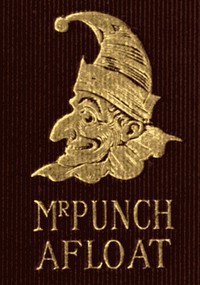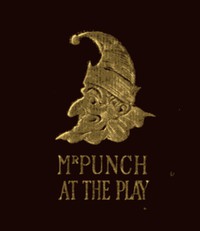Mr. Punch Afloat: The Humours of Boating and Sailing by Hammerton and Tenniel (love story novels in english .txt) 📗

- Author: Hammerton and Tenniel
Book online «Mr. Punch Afloat: The Humours of Boating and Sailing by Hammerton and Tenniel (love story novels in english .txt) 📗». Author Hammerton and Tenniel
Lately at Cookham accustomed to ply
And feather their oars with a deal of dexterity,
Pleasing the critical masculine eye?
They swing so truly and pull so steadily,
Multitudes flock to the river-side readily;—
It's not the eighth wonder that all the world's there,
But this watermaid eight, ne'er in want of a stare.
What sights of white costumes! What ties and what hatbands,
"Leander cerise!" We don't wish to offend,
But are these first thoughts with the dashing young women
Who don't dash too much in a spurt off Bourne End?
Mere nonsense, of course! There's no "giggling and leering"—
Complete ruination to rowing and steering;—
"All eyes in the boat" is their coach's first care,
And "a spin of twelve miles" is as naught to the fair.
[Pg 157]
Blenkinsop (on a friend's Yacht) soliloquises. "I know one thing, if ever I'm rich enough to keep a yacht, I shall spend the money in horses."
[Pg 158]
ECHOES FROM THE THAMES Scene—Houseboat in a good position. Time—Evening during "the Regatta week." Present (on deck in cozy chairs)—He and She.She. Very pretty, the lights, are they not?
He. Perfectly charming. So nice after the heat.
She. Yes, and really, everything has been delightful.
He. Couldn't possibly be better. Wonderful how well it can be done.
She. Yes. But, of course, it wants management. You know a lot comes down from town.
He. Will the stores send so far?
She. Yes, and if they won't others will. And then the local tradespeople are very obliging.
He. But don't the servants rather kick at it?
She. No, because they are comfortable enough. Put them up in the neighbourhood.
He. Ah, to be sure. And your brother looks after the cellar so well.
She. Yes, he is quite a genius in that line.
[Pg 160]
He. And it's awfully nice chatting all day.
She. Yes, when one doesn't go to sleep.
He. And, of course, we can fall back upon the circulating libraries and the newspapers.
She. And so much better than town. It must be absolutely ghastly in Piccadilly.
He. Yes, so I hear. And then there's the racing!
She. Ah, to be sure. To tell the truth, I didn't notice that very much. Was there any winning?
He. Oh, yes, a lot. But I really quite forget what——
She. Oh, never mind. We can read all about it in to-morrow's papers, and that will be better than bothering about it now.
[Scene closes in to soft music on the banjo.[Pg 159]
["For a mile and a half the river was covered with elegant craft, in which youth was always at the prow and pleasure always at the helm."—Daily Paper.]
"THE SAILORMAN'S MENOO" (To a Shipowner. By a Shell-back)It's mighty fine, yer talkin', but you never done no trips
In the bloomin' leaky foc'sle of yer leaky, rotten ships;
And though you gulls the public with a sham Menoo for us,
It isn't printed lies as makes provisions worth a cuss;
And even silly emigrants will tell you straight and true
That the test of grub is grubbin', not the advertised Menoo.
I'm talkin' now, not beggin' for a chance to starve and work
In an undermanned old tanker with a skipper like a Turk;
With a cook as larnt 'is cookin' when 'e 'ad to cook or beg,
Or go into an 'orspital to nurse a cranky leg;
And what I says I means it, and my words is plain and true,
Which is more than any sailorman will say for yer Menoo.[Pg 162]
I'll allow that in the look of it, the print of it I mean,
That all you say is sarved to us; but is it good or clean?
And wot's wet 'ash, or porridge, or any other stuff,
When at the very best of it there's 'ardly 'arf enough?
Not even with the cockroaches that's given with the stew,
Though I notice they nor maggots wasn't down in yer Menoo.
There's the tea and corfee talked of, but folks ashore ain't told
That the swine as bought it for you winked 'is eye at them as sold.
For sailormen's best Mocha was never further East
Than a bloomin' Essex bean-field; and the tea ain't tea—at least
It's on'y "finest sweepin's" from the docks, and wot a brew
It makes when sarved in buckets to drink to yer Menoo!
The pork and beef on paper, or a tin dish, makes a show,
But you'd want yer front teeth sharpened if you tackled it, my bo'!
For the beef is still the ancient 'orse wot worked on Portland Pier,
And the pork is rotten reasty, that was inwoiced twice too dear
If they charged you 'arf a thick 'un for the whack you gives the crew,
With the pickles and the butter set out fine in yer Menoo.
I'd like to take you jossers, as thinks as sailormen
Is a grumblin' lot of skulkers, just one trip and 'ome agen;
For when yer 'ands was achin' with sea cuts to the bone,
And the Baltic talked north-easters, you'd be alterin' of yer tone,
And might'nt think wot's wrote in print is necessary true,
And perhaps when you was safe agen you'd alter our Menoo.
Bertie (at intervals). "I used to—— What the—— do a lot of—— Conf—— rowing, one time!"
[Pg 161]
Boatman (spelling). "P-s-y-c-h-e. Well, that's the rummest way I ever see o' spellin' fish!"
[Pg 163]
HENLEY REGATTA (By Mr. Punch's Own Oarsman)Sir,—This letter is private and is not intended for publication. I particularly beg that you will note this, as on a former occasion some remarks of mine, which were intended only for your private eye, were printed. I of course accepted your assurance that no offence was meant, and that the[Pg 164] oversight was due to a person whose services had since the occurrence been dispensed with; but I look to you to take care that it shall not happen again. Otherwise the mutual confidence that should always exist between an editor and his staff cannot possibly be maintained, and I shall have to transfer my invaluable services to some other paper. The notes and prognostications which I have laboriously compiled with regard to the final results of the regatta will arrive by the next post, and will, I flatter myself, be found to be extraordinarily accurate, besides being written in that vivid and picturesque style which has made my contributions famous throughout the civilised world.
There are one or two little matters about which I honestly desire to have your opinion. You know perfectly well that I was by no means anxious for the position of aquatic reporter. In vain I pointed out to you that my experience of the river was entirely limited to an occasional trip by steamboat from Charing Cross to Gravesend. You said that was an amply sufficient qualification, and that no aquatic reporter who respected himself and his[Pg 166] readers, had ever so far degraded himself as to row in a boat and to place his body in any of the absurd positions which modern oarsmanship demands. Finding you were inexorable, and knowing your ridiculously hasty temper, I consented finally to undertake the arduous duties. These circumstances, however, make it essential that you should give me advice when I require it. For obvious reasons I don't much like to ask any of the rowing men here any questions. They are mostly in what they call hard training, which means, I fancy, a condition of high irritability. Their strokes may be long, but their tempers are, I regret to say, painfully short. Besides, to be candid, I don't wish to show the least trace of ignorance. My position demands that I should be omniscient, and omniscient, to all outward appearance, I shall remain.
In the first place, what is a "lightship"? As I travelled down to Henley I read in one of the newspapers that "practice for the Royal Regatta was now in full swing, and that the river was dotted with lightships of every description." I remember some years ago passing a very pleasant[Pg 168] half hour on board of a lightship moored in the neighbourhood of Broadstairs. The rum was excellent. I looked forward with a lively pleasure to repeating the experience at Henley. As soon as I arrived, therefore, I put on my yachting cap (white, with a gold anchor embroidered in front), hired a boat and a small boy, and directed him to row me immediately to one of the lightships. I spent at least two hours on the river in company with that boy—a very impudent little fellow,—but owing no doubt to his stupidity, I failed to find a single vessel which could be fairly described as a lightship. Finally the boy said they had all been sunk in yesterday's great storm, and with that inadequate explanation I was forced to content myself. But there is a mystery about this. Please explain it.
Secondly, I see placards and advertisements all over the place announcing that "the Stewards Stand." Now this fairly beats me. Why should the stewards stand? They are presumably men of a certain age, some of them must be of a certain corpulence, and it seems to me a refinement of cruelty that these faithful officials, of whom, I[Pg 170] believe, the respected Mayor of Henley is one, should be compelled to refrain from seats during the whole of the Regatta. It may be necessary for them to set an example of true British endurance to the crowds who attend the Regatta, but in that case surely they ought to be paid for the performance of their duties.
Thirdly, I have heard a good deal of talk about the Visitors' Cup. Being anxious to test its merits, I went to one of the principal hotels here, and ordered the waiter to bring me a quart of Visitors' Cup, and to be careful to ice it well. He seemed puzzled, but went away to execute my orders. After an absence of ten minutes he returned, and informed me, with the manager's compliments, that they could not provide me with what I wanted, but that their champagne-cup was excellent. I gave the fellow a look, and departed. Perhaps this is only another example of the asinine and anserous dunderheadedness of these crass provincials. Kindly reply, by wire, about all the three points I have mentioned.
I have been here for a week, but have, as yet, not been fortunate enough to see any crews.[Pg 172] Indeed, I doubt if there are any here. A good many maniacs disport themselves every day in rickety things which look something like gigantic needles, and other people have been riding along the bank, and, very naturally, abusing them loudly for their foolhardy recklessness. But no amount of abuse causes them to desist. I have puzzled my brains to know what it all means, but I confess I can't make it out. I fancy I know a boat when I see one, and of course these ridiculous affairs can't be boats.
Be good enough to send me, by return, at least �100. It's a very difficult and expensive thing to support the dignity of your paper in this town. Whiskey is very dear, and a great deal goes a very short way.
Yours sincerely,
[Pg 165]
Jolly Young Waterman. "Holloa! Hi! Police! Back water, Jack! We've got into a nest of swans, and they're a pitchin' into me!"
[Pg 167]
Small Boy. "'Old 'ard, guv'n'r! And take me and my traps acrosst—will yer?"
[Pg 169]
Fiend in human shape. "Don't feel well! Try a cigar!"





Comments (0)